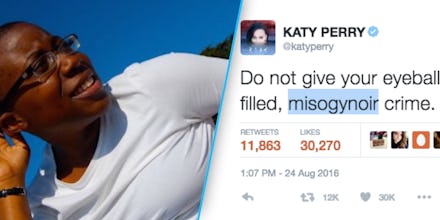Meet Moya Bailey, the black woman who created the term "misogynoir"

As Leslie Jones faced yet another onslaught of racist, sexist cyber attacks last week, fans and fellow celebrities tweeted out their support for the actress using the hashtag #StandWithLeslie. But amid the outpouring of solidarity, a tweet from singer Katy Perry stood out.
"Do not give your eyeballs to this racist, hate-filled, misogynoir crime," she wrote. "I #StandWithLeslie."
What struck Twitter users about Perry's message was her word choice: "Misogynoir" is a term queer black feminist scholar and Northeastern University professor Moya Bailey invented in 2010 to describe the specific way racism and misogyny combine to oppress black women. Though the word is frequently used among communities of black women on Twitter and Tumblr, it felt significant that a mainstream celebrity like Perry would use it or be familiar with it at all.
"I think people find it compelling because [misogynoir] doesn't affect her own moving through the world," Bailey said in a phone interview on Monday, referring to Perry.
Still, however compelling, Bailey worried that praising the singer too much ignores the black women who have long been having these conversations, using this terminology and working hard to fight against systems of oppression.
"We see allies getting a lot of points for using terminology that marginalized communities have been using for a while, like when men talk about feminism or white people talk about racism," said Bailey. "There's a real celebration of those instances as opposed to a willingness to listen to the people most affected."
Many shared Bailey's concern, especially after the Washington Post tweeted out its article on Perry's response, writing that the singer had "introduced 'misogynoir' to white mainstream America."
Twitter user Cham accused the outlet of "erasure," and wrote that the Post's tweet seemed to say, "'We can recognize the word 'misogynoir' now that we can credit a [white woman].'"
Some are skeptical of words like "misogynoir" altogether — words that have been invented in the last decade or so and appear to thrive solely on social media platforms like Tumblr, a site known as an enclave for so-called "social justice warriors."
On Friday, New York magazine senior editor Jesse Singal tweeted out the definition of "kyriarchy" (defined, in the screenshot he includes, as "the social system that keeps all intersecting oppressions in place"). "If we just make up enough new words," he wrote, "oppression will melt away through the sheer force of our theorizing."
To anyone who might criticize "misogynoir" on the same basis, Bailey would say that there's power in creating a word for something that already exists but, for the most part, remains nameless. And for Bailey, the more specific, the better — "people of color," "women of color," "patriarchy" and "racism" can often be dangerously broad.
"I think we have to refine language in a lot of different ways so we can actually come up with solutions that help the communities we want to address," she said. "When you use language that's generic or unspecific you can get at some of the problem, but not all of it."
"Misogynoir" has inspired writers and scholars to tease out the intersection of misogyny and racism, exploring all of its iterations in popular culture. Trudy, creator of the now-defunct womanist blog Gradient Lair published a foundational explainer on the term in 2014; a few months later, Awl contributor Laur M. Jackson wrote "Memes and Misogynoir," an essay examining bigotry's grip on internet culture.
Since, there have been countless blogs and Reddit threads — a search for the "misogynoir" tag on Tumblr reaps everything from posts quoting Angela Davis to memes calling out the harassment of Olympic gymnast Gabby Douglas.
"I really enjoy the work people have done on Tumblr and Twitter," said Bailey. "And we've seen that work actually move conversations beyond those spaces."
Currently, Bailey's working on a book called Contesting Misogynoir, where she says she'll focus on the ways black women fight back against their own oppression in the digital space. For one, Bailey said their resistance has given rise to uplifting hashtags like #BlackGirlMagic and #GirlsLikeUs, which celebrate black women and black trans women.
"On the one hand I'm glad I created something I find useful but I feel a sense of sadness that it needs to be used so much," Bailey said. "There's a necessity to continue using this word."